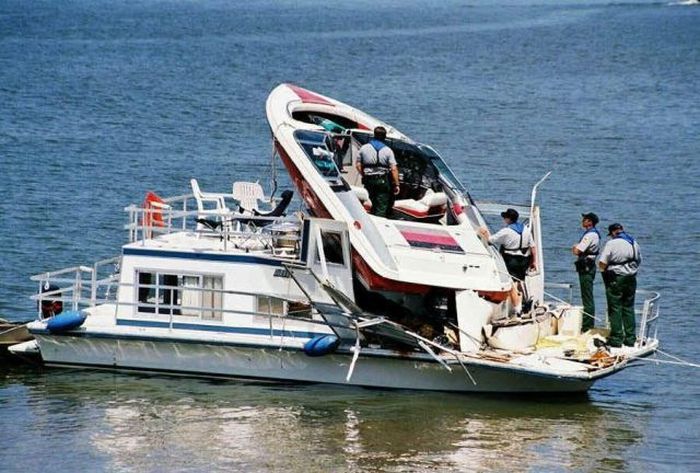Boating is a pleasure that’s hard to defeat. As amazing as the water can be, it’s also very dangerous. To be out in the water, you have to be well trained and well equipped to face all the challenges nature puts before you.
As if these natural challenges aren’t enough, but you’re also facing the challenge of colliding with another boat.
With all these threats around you, what should you do to avoid colliding with another boat?
Read on to find out!
Follow Navigation Rules
It’s crucial to follow the general navigation rules. Always remind yourself of the navigation rules and never ignore them. You can dedicate a few minutes before every trip to go through the navigation rules with your crew.
You can even make a fun game or song out of them and make it a ritual before every trip. This way you and your crew will always remember the rules.
Stay Safe
If you’re tired or stressed, avoid sailing your boat. Your full attention and energy are crucial to pay attention to all the details and prevent any accidents.
There are many elements around you that you have to look out for. Whether it’s other boats, rocks, storms, or weather changes, it’s always important to be awake and present.
Lookout Person
A good idea is to hire someone as the lookout. Your lookout person will help you grasp all the givens and factors around you. They can also help you recognize any problem with your boat.
Be extra careful in traffic. Make sure to take into consideration all the boats around you before taking any action. Look in all directions and stay focused and connected with other boats.
Abide by the Speed Limits
Always stay within the allowed speed limits. Even if you don’t see any visible danger around you or any other boats. This is especially essential in high-traffic areas and at night.
Sound Signals
One of the most critical aids that’d help you avoid a collision is utilizing sound signals. This is one of the most common ways of communication between boats.
Different sounds have different meanings. You have to be able to understand and use them properly.
Sailors usually use sound signals in traffic or when another boat is in sight and you want to communicate with them.
You have to be careful when you use sound signals. For instance, you shouldn’t use sound signals if no other boat is in sight.
Sometimes when the weather is foggy or threats clear vision, you may not be able to see other boats. If that’s the case, follow the rules and instructions of this particular situation instead of solely depending on sound signals.
Each sound or combination of sounds is translated into a specific move or direction. Study these sounds carefully because you won’t only use them, but you’ll also receive them from other boats as well.
They’re like traffic signals and traffic lights on the road, it’s inevitable to know them by heart to assure your, and other’s safety.
Use Virtual Aids of Navigation
Virtual navigation is key for your safety. It can be a lifesaver in times of emergency, especially when you lose communication with those around you or get lost mid-water.
Regardless of the weather conditions, virtual navigation would probably work just fine. It can also be very beneficial in case you want to report an accident immediately.
One of the great benefits of virtual navigation is how easy it is to install. It’s also very cost-efficient.
Through virtual navigation, you can identify hazardous and safe areas. It can identify dangerous areas underwater as well as restricted areas and shores.
Using a Radar to Track Other Boats
A marine radar system helps you track other boats. It allows you to take precautions and plan your way accordingly. Tracking other boats and vessels keeps everyone safe. This way, you can avoid any surprises or boats coming from nowhere.
Starboard, Port, and Stern
These are the left and right directions in marine jargon. Moving and changing the directions of your boat can be tricky.
The size, depth, type of the boat, and water you’re sailing in will make a difference. There are a lot of techniques and signals to communicate with other boats about each other’s directions. Sound signals are one of the main ways you can do that.
Remind Yourself of the Basic Rules
No matter how long you’ve been sailing, always remind yourself of the basic rules.
Basic sailing rules include safety regulations on the boat, the nature of the water you’re sailing into, and the proper decisions in each different weather state. T
These may seem extremely basic, but constantly reminding yourself of them will be beneficial.
You can also go through different success stories of people who were able to conquer hard situations in the water. This should train your mind to be as fast as possible while keeping in mind all the probabilities you could make a decision upon.
This will come handy in times of emergency. The more you go through the basics, the more your mind will be present and fast to make hard yet correct decisions.
Conclusion
Safety always comes first. Being cautious isn’t a choice when you’re in the water. Following all the navigation and sailing rules will keep you safe and prevent you from accidentally hurting others.
Using technological aids to communicate with other boats or to navigate the water is a huge advantage to keep you safe.
Even in places where traffic is not an issue, virtual navigation aids let you see any colliding threat before it happens and within a proper time window. If a boat is coming fast out of nowhere, you’ll be able to spot it, communicate with it, or find the safest way so you can avoid it.
Understanding marine jargon and sound signals are also key. This way, you’ll properly which direction they’re heading and what your next action should be.

